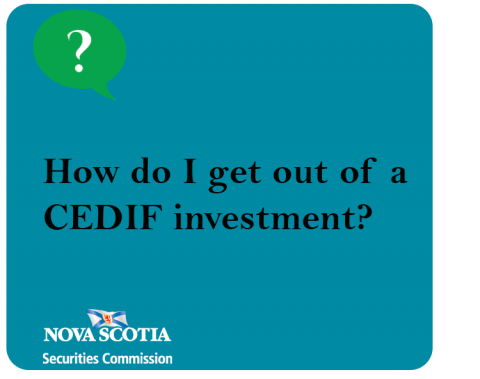Submitted by nsscadmin on

Getting out of a CEDIF investment can be difficult and even if you can get out you may not be able to get your original purchase price or expected value for the shares.
One important thing to know before you look into disposing of your CEDIF shares. If you dispose of your shares, for any reason other than death before the five-year hold period has expired, you may be required to pay back the equity tax credit. The Nova Scotia Department of Finance will recover these funds from the Canada Revenue Agency.
There is no organized market through which CEDIF shares may be sold. This make selling extremely difficult or even impossible in some instances and it also makes it difficult to determine their fair market value.
If you do decide you would like to try and sell your CEDIF shares here are your options.
i) You may sell your CEDIF share directly to the CEDIF. However, the CEDIF has no legal obligation to purchase your shares, nor do they have to purchase them at a set price. Any decision on share purchase by a CEDIF is made by the board of directors. Also, the CEDIF may need to comply with the Equity Tax Credit Act and in certain situations requires written approval from the Minister of Finance.
ii) You may sell your CEDIF shares to an existing CEDIF shareholder. This transaction can be done at any price as decided by the two parties, but the seller must provide the buyer with a statement advising them in writing prior to entering into an agreement of purchase and sale that the purchaser shall not accrue any advantage under the Equity Tax Credit Act as a result of such purchase.
iii) You may also sell your CEDIF shares to other purchasers, as long as the purchasers comply with the Securities Act and any applicable securities rules. Such purchases may include a close friend, family member or business associate of one of the directors or officers of the CEDIF or an accredited investor.
Before attempting to sell your CEDIF shares we recommend consulting a tax accountant to determine if the sale would have any negative effect on your tax filings and if necessary to consult a securities lawyer to determine if all requirements for the sale of securities are being met.
